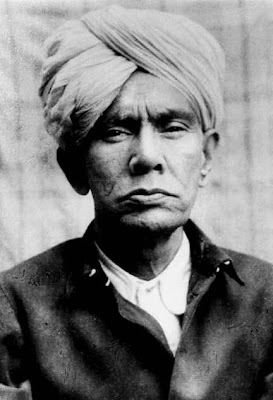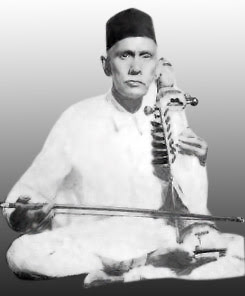Ustad Bundu Khan, probably the most outstanding sarangi player during the first half of the 20th century, was born in Delhi, in a family of musicians. He received his early training in sarangi from his father Ali Jan Khan and later from his uncle Mamman Khan, who was attached to the Maharaja of Patiala.
Bundu Khan was a prodigiously talented artiste and also a very sincere and hard-working student of music. His complete mastery over his delicate and difficult instrument not only placed him on the top rung of the subcontinents sarangi players but also made him one of the most proficient Hindustani instrumentalists of the 20th century. He had a flair for singing and writing poetry as well. His sons, Umrao Bundu Khan and Buland Iqbal, also inherited his talents.
He played the sarangi from the Delhi Radio Station, when its broadcast was started in 1935. He became court-musician to Maharaja Tukaji Rao Holkar of Indore and was also in the Rampur court of a brief period. He was highly influenced by Pandit Bhatkhande whom he met in Indore. He devoted himself to the study of musicology, and wrote a book Sangeet Vivek Darpan wherein the ragas Bhairabi and Malkauns were elaborately discussed.
After migrating to Pakistan after the partition in 1947, Ustad Bundu Khan continued to play the sarangi from all the radio stations of Pakistan till his death in 1955. Both his sons gained prominence and became immediately known to the music circles of Pakistan. In addition to his descendants, he trained Amir Muhammad Albi, Durkhu Singh, Majid Khan, Muhammad Sagiruddin Khan and P. N. Nigam. He was posthumously awarded the Pride of Performance by the Government of Pakistan in 1985.
Bundu Khan was a prodigiously talented artiste and also a very sincere and hard-working student of music. His complete mastery over his delicate and difficult instrument not only placed him on the top rung of the subcontinents sarangi players but also made him one of the most proficient Hindustani instrumentalists of the 20th century. He had a flair for singing and writing poetry as well. His sons, Umrao Bundu Khan and Buland Iqbal, also inherited his talents.
He played the sarangi from the Delhi Radio Station, when its broadcast was started in 1935. He became court-musician to Maharaja Tukaji Rao Holkar of Indore and was also in the Rampur court of a brief period. He was highly influenced by Pandit Bhatkhande whom he met in Indore. He devoted himself to the study of musicology, and wrote a book Sangeet Vivek Darpan wherein the ragas Bhairabi and Malkauns were elaborately discussed.
After migrating to Pakistan after the partition in 1947, Ustad Bundu Khan continued to play the sarangi from all the radio stations of Pakistan till his death in 1955. Both his sons gained prominence and became immediately known to the music circles of Pakistan. In addition to his descendants, he trained Amir Muhammad Albi, Durkhu Singh, Majid Khan, Muhammad Sagiruddin Khan and P. N. Nigam. He was posthumously awarded the Pride of Performance by the Government of Pakistan in 1985.
from: http://www.itcsra.org/tribute.asp?id=14 There you find some beautiful tracks.
See also:
Part 1 (45:27):
01 Chandni Kedar 12:31 (starting at 8:43)
02 fragment 0:35 (starting at 22:38)
03 Gaud Malhar 15:03 (starting at 24:37)
04 fragment 2:33 (starting at 40:40)
05 Dhrupad Sagar (Ragamalika) 1:59 (starting at 43:27 and continuing in part 2)
Part 2 (44:41):
01 continuation of Dhrupad Sagar (Ragamalika) 2:29
02 Chandrakauns 6:21 (starting at 3:14)
03 Shahana Bahar & Bageshree Bahar 26:22 (starting at 11:59)
04 Bhairavi 4:17 (starting at 38:51)
Download Part 2
Further - very enjoyable - readings: look here under "About Bundu Khan"


No comments:
Post a Comment